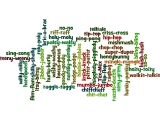Knock-knock, zigzag, hobson-jobson — words and phrases like these appear in English thanks to reduplication. According to Wikipedia, there are three types of English reduplication: exact, rhyming and ablaut (which is a fancy word for vowel permutation).
Exact reduplication is self-explanatory.
| bling-bling | expensive and ostentatious possessions |
| chop-chop | quickly, without delay |
| goody-goody | affectedly or ingratiatingly good or proper |
| hush-hush | secret |
| no-no | taboo |
| so-so | average |
We are often creating exact reduplications on the fly when we want to stress that something is “real” or “authentic” (as opposed to its pale imitation). For example, in an interview with Tomer Zvulun I read:
You’ve been Assistant and Associate Director here at Seattle Opera in the past. What’s it like to come back, now as Director Director?Apparently, “Director Director” here means “real” Director.

Although their parts rhyme, rhyming reduplication may be not the best term for the phrases in the table below. They are not just rhymes — apart from the first consonant, they are identical.
| bee’s knees | something excellent |
| hanky-panky | mischievous behaviour; sexual intercourse |
| heebie-jeebies | a feeling of anxiety, fear etc. |
| higgledy-piggledy | haphazard |
| hocus-pocus | (an act of) trickery |
| hodge-podge | a variety of miscellaneous things |
| hoity-toity | snobbish |
| hotchpotch | hodge-podge |
| holy moly | an expression of surprise |
| honey bunny | honey, sweetheart |
| hurly-burly | uproar, tumult |
| itsy-bitsy | teeny-weeny |
| mumbo jumbo | nonsense, gibberish |
| namby-pamby | insipid, sentimental, weak |
| nitty-gritty | details, nuts and bolts |
| palsy-walsy | being or appearing to be very intimate |
| ragbag | hotchpotch |
| raggle-taggle | motley, mixed |
| razzle-dazzle | glamour |
| roly-poly | short and plump (person) |
| super-duper | superb |
| teeny-weeny | minuscule |
| Tex-Mex | a fusion of Texan and Mexican (cuisine) |
| walkie-talkie | handheld transceiver |
| willy nilly | whether wanted or not |
An amateur etymologist in me would like to see Latin nolens volens not only in Italian volente o nolente (that is kind of obvious) but also in Russian волей-неволей, English willy-nilly, Dutch willens of onwillens — of course, modified according to the law of Hobson-Jobson. But what about Albanian dashur padashur, Dutch goedschiks of kwaadschiks, French bon gré mal gré, Greek εκών άκων, Hungarian kénytelen-kelletlen, Malay mau tak mau, Polish chcąc nie chcąc or Romanian vrând-nevrând? It looks like we humans just love to rhyme.
A special case of rhyming reduplication is so-called shm-reduplication. It is often used to convey a dismissive or ironic feeling for a thus reduplicated word, as in metalinguistic, shmetalinguistic or forbidden, shmershmidden (courtesy of Bender Rodríguez).
In ablaut reduplication, it is the vowel (typically, the first vowel) that change. Many words formed this way are onomatopoeic.
| bric-a-brac | knick-knacks |
| chiffchaff | a warbler, Phylloscopus collybita |
| chit-chat | mindless banter |
| criss-cross | move back and forth |
| flim-flam | fraud, deception |
| flip-flop | a type of footwear; to alternate back and forth |
| hip-hop | an Afro-American urban youth culture |
| jibber-jabber | blather |
| knick-knack | trinket |
| mingle-mangle | hodgepodge |
| mishmash | mingle-mangle |
| ping-pong | table tennis |
| pitter-patter | repetitive sound (of rain etc.) |
| riff-raff | rabble, common people |
| shilly-shally | to procrastinate or vacillate (“shall I?”) |
| sing-song | song-like |
| telltale | talebearer, gossip |
| tip-top | excellent |
| wishy-washy | wavering; watery |
Both rhyming and ablaut reduplications can be further classified like this:
- A combination of one meaningful word and its “mutated” form present for emphasis: jibber-jabber, super-duper
- Apparently nonsensical combination of two meaningful words: bee’s knees
- Apparently nonsensical combination of two nonsense words: heebie-jeebies
- Meaningful combination of two meaningful words: telltale, walkie-talkie
Phrases like creepy-crawly, hunky-dory and topsy-turvy are similar to reduplications (in that they sound like baby talk) but they are neither rhyming nor reduplications.






No comments:
Post a Comment